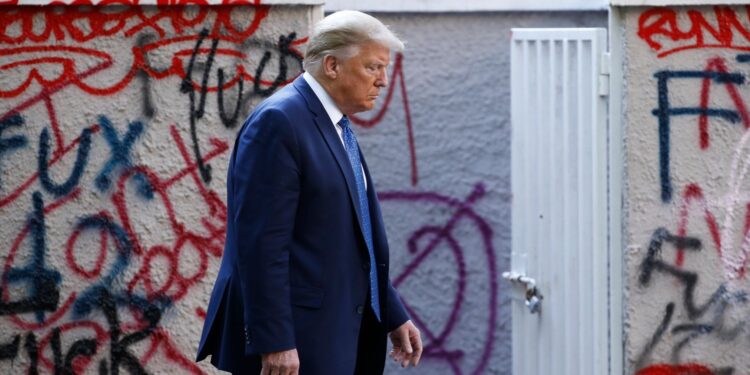When President Donald Trump was asked this week if he planned to designate Antifa as a domestic terror organization, he didn’t hesitate. “It’s something I would do, yeah,” he told reporters, adding bluntly, “Antifa is terrible.” Within days, he doubled down on his own social media platform: “I am pleased to inform our many U.S.A. Patriots that I am designating ANTIFA, A SICK, DANGEROUS, RADICAL LEFT DISASTER, AS A MAJOR TERRORIST ORGANIZATION. I will also be strongly recommending that those funding ANTIFA be thoroughly investigated in accordance with the highest legal standards and practices.”
This announcement isn’t entirely new. More than five years ago, Trump attempted a similar move, declaring his intent to treat Antifa as a terrorist threat. At the time, the effort faltered in the face of legal and bureaucratic barriers. But the persistence of the problem — and Trump’s renewed push — says a lot about where the country stands today.
For years, Antifa has been described by its supporters as nothing more than a loose collection of “anti-fascist” activists, without formal offices, leadership, or a membership list. Critics argue that this absence of formal structure is precisely what makes it dangerous. Without accountability, individuals can commit violence under the banner of Antifa and then deny responsibility. The lack of a central organization provides cover, allowing a revolving door of activists to disrupt communities, damage property, and intimidate political opponents while insisting no “organization” exists.
This dynamic has long frustrated law enforcement, local officials, and citizens who are left to deal with the consequences of riots and destruction. When police cars are torched, businesses looted, and neighborhoods left in ruins, it matters little to the victims whether Antifa is incorporated or registered with the IRS. What matters is that chaos spreads and communities suffer.
Trump’s renewed push reflects a broader frustration with what many Americans see as a double standard in how violence is policed. For years, federal officials have been quick to treat right-leaning groups as organized threats, while Antifa’s brand of left-wing militancy has often been brushed off as disorganized activism. Trump’s effort flips that narrative, making clear that violence under any political banner is still violence — and deserves consequences.
The legal landscape does complicate matters. The United States does not have a domestic terrorism statute that cleanly allows the designation of a group like Antifa. This means the administration’s tools are limited. Yet, the symbolic power of labeling Antifa as a “major terrorist organization” should not be underestimated. The president’s words send a message: political violence from the radical left will no longer be excused or ignored.
Of course, critics argue that without a clear organizational structure, the designation could be misapplied. If the government alone decides who qualifies as “Antifa” and who doesn’t, the scope could be broad. That’s where concerns about liberty and due process enter the conversation. Conservatives know well that unchecked government power can become its own danger. Labeling must be paired with precision and restraint, ensuring that legitimate dissent is not swept up alongside violent extremists.
Still, Trump’s instincts tap into something real. Americans have witnessed what happens when mobs take over city streets, when law enforcement is sidelined, and when ordinary citizens are left to fend for themselves. Those experiences — from Portland to Kenosha — left deep scars. They also exposed the inability or unwillingness of some local leaders to enforce law and order, leaving residents to wonder who was truly in charge.
Five years after his first attempt, Trump is signaling that he has not forgotten the mayhem and that he intends to act. While the legal mechanics may be complicated, the political and cultural signal is unmistakable. For a country weary of disorder, the message that Antifa will be treated not as a ragtag band of activists but as a terrorist threat resonates.
The broader lesson here is one conservatives have long understood: when government fails in its most basic duty to protect life and property, it loses legitimacy. Trump’s move to designate Antifa underscores a return to first principles — law, order, and accountability — and a rejection of the dangerous notion that chaos carried out under the banner of “activism” is somehow acceptable.
Whether or not the bureaucrats find a tidy legal box for Antifa, the American people know what they’ve seen: violence, intimidation, and destruction. Trump’s declaration makes clear that those days of denial are over.




















